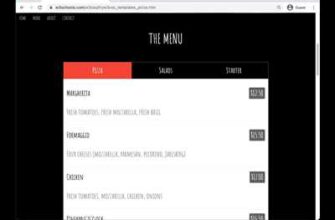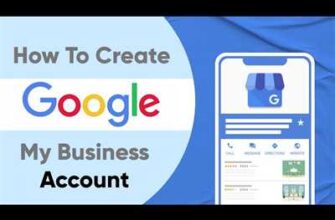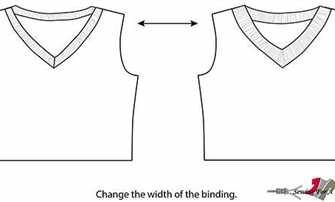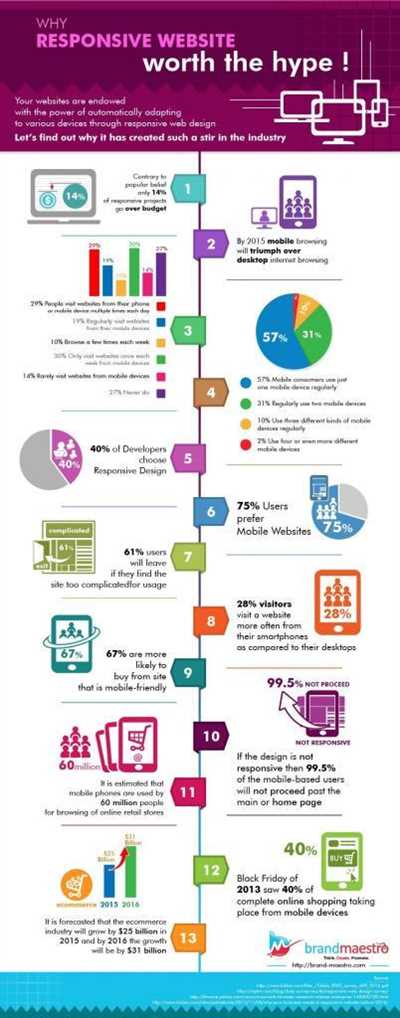
If you’re interested in a career in web development, there are many important steps you’ll need to take. Web developers build and maintain websites, and their role is crucial in today’s internet-driven world. Whether you’re starting from scratch or looking to switch careers, becoming a web developer can be a great opportunity to land a job in a dynamic and in-demand field.
The first step to becoming a web developer is to focus on your education. While some developers are self-taught, most employers will expect you to have some sort of formal education or equivalent experience. You can start by taking courses at a university or through online resources like Udemy or Coursera. There are tons of courses available on front-end and back-end development, website designing, and more.
In addition to formal education, it’s also important to build your own portfolio of projects. This will demonstrate your skills and potential to potential clients or employers. Start by building a personal website or create projects that showcase your abilities. You can also contribute to open-source projects on platforms like GitHub, which will not only help you build your portfolio but also allow you to collaborate with other developers.
Networking is another important aspect of becoming a web developer. Attend industry events, join online forums and boards, and connect with other developers in your local community. Building a strong network can help you land job opportunities, learn from others, and stay updated with the latest trends and technologies in web development.
One of the most important tips for becoming a web developer is to continuously learn and stay updated. The field of web development is constantly evolving, and new frameworks, languages, and methodologies are always emerging. It’s important to stay current with these changes and continue learning throughout your career. Dedicate time each week to learn new technologies, practice coding, and stay involved in the web development community.
Finally, consider gaining practical experience through internships, apprenticeships, or freelancing. While education and personal projects are important, actual hands-on experience in a professional setting is invaluable. It will not only provide you with real-world examples to showcase in your portfolio but also give you a chance to work on real projects and solve real-world problems.
In conclusion, becoming a web developer can be a rewarding career choice for anyone who enjoys working with technology and has a passion for creating websites and web-based solutions. By following these steps and dedicating time and effort to your education and professional growth, you can build a successful career as a web developer.
- WHAT DOES A WEB DEVELOPER DO
- How to become
- University
- College
- Apprenticeship
- Work
- More Information
- How to Find Your First Web Development Client or Become a FREELANCER
- 1 Get on Job Boards
- 2 Put Together a Portfolio Site
- 3 Start Networking
- What is Web Development
- Video:
- Starting a Small Business as a Web Developer
WHAT DOES A WEB DEVELOPER DO
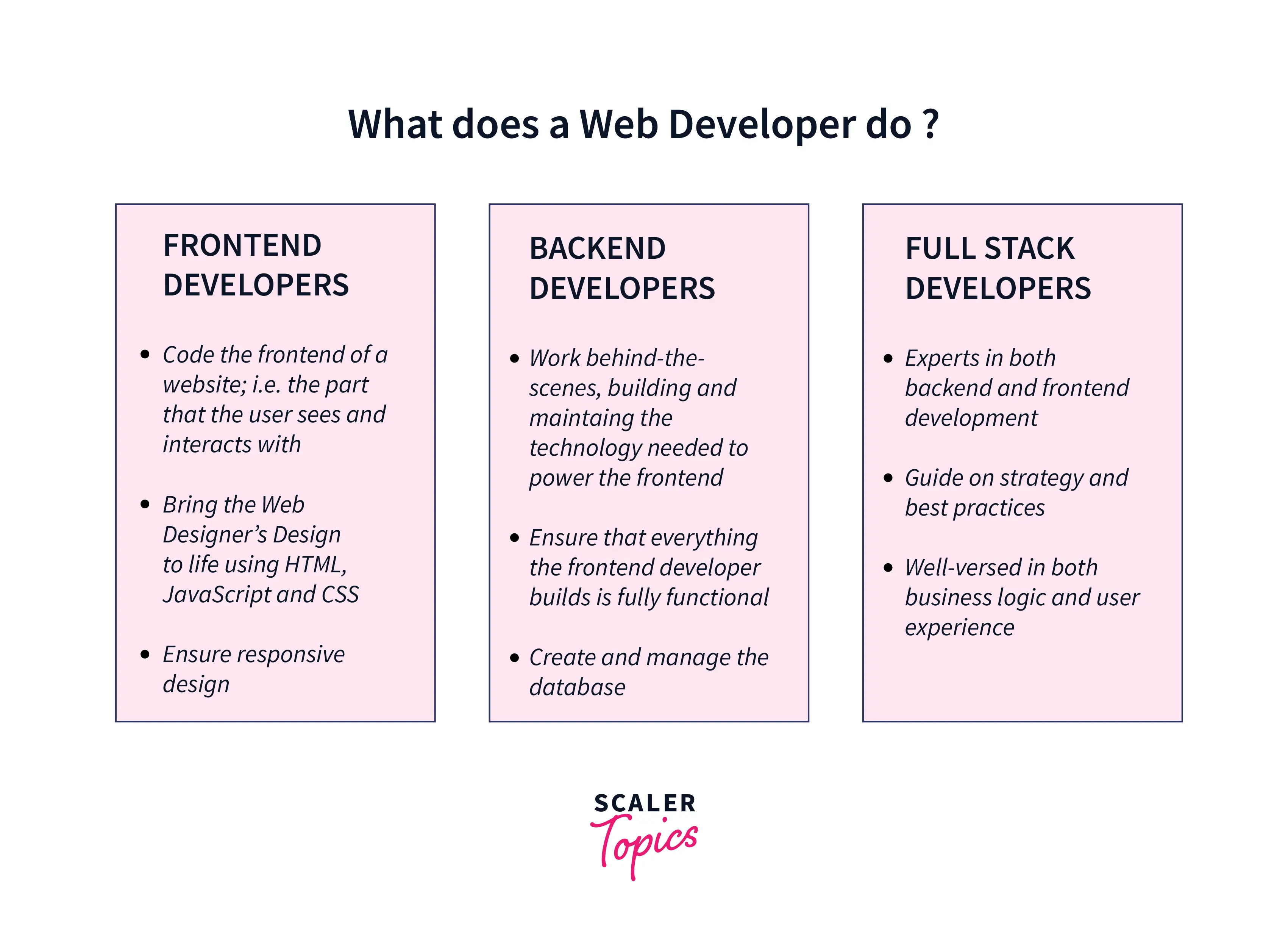
A web developer is a person who builds and maintains websites on the Internet. They work with clients or on their own as freelancers, developing websites to meet the client’s specific needs and requirements. Web developers are responsible for creating websites that are visually appealing and user-friendly, with features such as animation, mobile responsiveness, and easy navigation. They use different techniques and programming languages like HTML, CSS, JavaScript to build websites and make them functional.
Web developers are proficient in front-end and back-end development. Front-end developers focus on the visual aspects of a website, ensuring that the design is aesthetically pleasing and the user experience is smooth. Back-end developers work more on the behind-the-scenes functionalities of a website, such as database management and server-side scripting.
Web developers also utilize various software tools and resources to help them in their work. They may use platforms like WordPress or GitHub to streamline the development process and collaborate with other developers. They constantly test and debug their codes to ensure the website functions properly and troubleshoot any issues that may arise.
In terms of education, becoming a web developer doesn’t necessarily require a diploma or advanced degree. Many web developers are self-taught and have learned through online resources and personal experience. However, having a degree or certification in web development can give a prospective web developer a competitive edge and show their proficiency in the field.
Web developers have great job prospects in today’s growing digital world. With the increasing reliance on the internet and mobile devices, the demand for web developers is only expected to rise. They can work for companies of all sizes or as freelancers, and their work hours can vary depending on the client’s requirements. Some web developers may work a standard 40-hour work week, while others may find themselves clocking in more hours to meet deadlines or work on multiple projects.
In conclusion, a web developer is responsible for building and maintaining websites, ensuring their visual appeal, functionality, and user-friendliness. They use different programming languages and techniques to develop websites and work on both front-end and back-end development. Whether working for a company or as a freelancer, web developers play a crucial role in the online world, helping to put together the various pieces that make up the websites we see and interact with every day.
How to become
To become a web developer, there are several essential steps that you should keep in mind. Whether you are a current university student, a three-year diploma holder, or someone who has been growing in the field of computer science, these steps will guide you on your journey to becoming a successful web developer.
- Educate Yourself: Start by gaining the necessary knowledge and skills in web development. Take online courses, attend workshops, or enroll in a web development program offered by a university or college.
- Focus on Front-End Development: Front-end web development is an important aspect of creating websites and applications. Learn HTML, CSS, and JavaScript to build interactive and user-friendly websites.
- Get Hands-on Experience: Practice what you have learned by working on personal projects or contributing to open-source projects on GitHub. This will not only enhance your skills but also provide you with examples to show prospective employers.
- Build Your Personal Brand: Create a personal website or blog to showcase your work, skills, and testimonials from clients or colleagues. Having an online presence is essential in the current digital age.
- Keep Up with the Latest Trends: Web development is a constantly evolving field. Stay updated with the latest technologies, frameworks, and design trends to remain competitive in the job market.
- Network and Attend Events: Networking is crucial in any career, including web development. Attend industry events, conferences, and meetups to connect with other professionals and learn from their experiences.
- Consider Freelancing or Part-Time Gigs: Starting as a freelancer or taking up part-time web development gigs can provide you with valuable experience and also help you earn money while building your portfolio.
- Apply for Web Developer Jobs: Once you feel confident in your skills, start applying for web developer positions. Utilize job boards, networking connections, or online freelance platforms to find job opportunities.
- Continuous Learning: Web development is a field that requires constant learning and upgrading of skills. Take advanced courses, learn new coding languages, and stay curious to stay relevant in the industry.
Remember, becoming a web developer doesn’t necessarily require a degree. What matters is your passion, dedication, and continuous effort to learn and improve. With the right resources and a well-structured plan, you can successfully become a web developer and embark on an exciting career in the world of software development.
University
University can be a great entry point for aspiring web developers. While there are many paths to becoming a web developer, pursuing a three-year degree in computer science or a related field from a reputable university offers a structured learning environment and valuable resources. Universities often provide access to events, internships, and networking opportunities that can help students kickstart their careers.
A university degree in computer science or a related field doesn’t just focus on web development – it covers a wide range of digital topics, including software development, networking, and mobile solutions. This holistic approach can offer a deeper understanding of the broader field of technology and make graduates better equipped to take on a variety of roles in the tech industry.
One of the advantages of pursuing a degree at a university is that it provides a comprehensive curriculum that incorporates both theoretical knowledge and practical skills. For example, students may learn programming languages like HTML, CSS, and JavaScript, as well as gain experience in user interface design and creating interactive web features.
Moreover, universities often have faculty members who are experienced web developers themselves and can offer guidance and mentorship to students. They can provide valuable insights and industry perspectives that can help students stay updated with the latest trends and technologies in web development.
While a university degree may require a significant investment of time and money, it also offers long-term benefits. Prospective employers may place more value on a degree when considering job candidates, and having a degree can open doors to higher-level positions and better-paying gigs. Additionally, university programs often provide access to career services, which can help students connect with potential employers and find job opportunities.
However, it is important to note that a university degree is not the only path to becoming a successful web developer. There are many self-taught developers who have built successful careers without formal education. The key is to keep learning and staying up-to-date with the latest technologies and trends in the industry, whether through university or other means.
In conclusion, pursuing a university degree in a relevant field can offer a structured and comprehensive education in web development. It provides valuable resources, opportunities, and guidance that can help aspiring web developers grow their skills and knowledge. However, it is important to remember that success as a web developer ultimately depends on one’s passion, dedication, and ability to keep learning and adapting to the ever-evolving field of web development.
College
When looking to become a web developer, many individuals wonder if a degree from a college or university is necessary. While it is not essential to have a diploma in web development to land a job in this field, it can be incredibly beneficial.
Attending a college or university can provide individuals with a well-rounded education that goes beyond just web development. It exposes them to a variety of topics and helps develop critical thinking, problem-solving, and communication skills. Additionally, having a degree from a known and respected institution can give job applicants an edge over their competition.
College programs usually offer courses that cover a wide range of topics, including web development fundamentals, programming languages like HTML, CSS, and JavaScript, responsive design, and creating animations. Students can also gain advanced knowledge in areas such as database management, server-side scripting, and mobile application development.
One great advantage of attending college is the opportunity to build a portfolio. Many programs require students to complete real-world projects that can be showcased to potential employers. These projects act as examples of the skills and solutions the student has developed during their studies.
Moreover, colleges often provide networking events and job fairs where students can meet industry professionals and connect with potential employers. Building a network can be crucial in the web development industry, as it can lead to internships, freelance gigs, and full-time employment.
For those who prefer a more self-paced learning experience or cannot afford the time and money investment of traditional college, there are alternative options available. Online courses, coding bootcamps, and tutorials from platforms like Udemy and Coursera can provide the necessary knowledge and skills to become a web developer.
However, it is important to note that not having a college degree doesn’t mean an individual cannot be successful in the web development field. Many self-taught developers have become proficient in web development and have built successful careers. The key is to stay motivated, keep up with industry trends, and continuously improve skills.
No matter the path chosen, having a strong understanding of web development principles and being able to showcase practical examples of work is what employers usually look for. Whether it’s a degree or a portfolio from GitHub, what’s essential is being able to prove the ability to create functional and visually appealing digital applications on the web.
Apprenticeship
In the world of web development, apprenticeship is a great opportunity for aspiring developers to gain hands-on experience and learn from professionals in the field. Many companies, usually web development agencies or tech startups, offer apprenticeship programs to help individuals kick-start their career in the industry.
During an apprenticeship, you’ll typically work on real-life projects, building and maintaining websites or web applications. This hands-on experience will give you a chance to apply what you’ve learned in courses and resources, and develop your skills further. Apprenticeship programs often focus on building responsive and user-friendly websites, where the design and functionality meet the client’s requirements.
To start an apprenticeship successfully, there are a few essential things you’ll need. First and foremost, a strong foundation in web development is necessary. This includes knowledge of HTML, CSS, JavaScript, and other technologies used for building websites. It’s also important to have a good understanding of how the internet works and basic computer skills.
If you’re new to web development, it’s recommended to start with beginner-level courses or resources to familiarize yourself with the basics. Once you have a solid understanding of the fundamentals, you can move on to more advanced topics and techniques.
One of the great advantages of an apprenticeship is the opportunity to learn from experienced professionals. They can guide you through different stages of a project, teach you best practices, and help you troubleshoot any issues that arise. Apprenticeship programs also often infuse networking events, where you can meet other professionals in the industry and expand your personal network.
Apprenticeship programs are known for their flexibility and adaptability. Companies understand that not every apprentice will have the same background or skill level, and they design their programs to accommodate those differences. Whether you’re a recent high school graduate with only GCSEs or a university student studying software development, there’s an apprenticeship program for you.
One of the key features of an apprenticeship is the chance to work on real projects and contribute to the company’s success. This hands-on experience is invaluable when it comes to building your portfolio and landing a job in the future. Additionally, apprenticeship programs often offer testimonials or references that can vouch for your skills and dedication.
If you’re considering an apprenticeship, it’s important to find a company that aligns with your goals and values. Research different companies and look for ones that have a strong track record of successful apprenticeships. Check their website or GitHub to see the projects they’ve worked on and the technologies they use. This will give you an idea of the kind of work you’ll be doing and whether it’s something you’re interested in.
During your apprenticeship, you’ll often work alongside experienced developers, learning from them and getting guidance when needed. They’ll teach you how to successfully contribute to a project, collaborate with a team, and maintain code quality. This mentorship aspect is invaluable and can help you grow both as a developer and as a professional.
Overall, an apprenticeship is a fantastic way to kick-start your career in web development. It offers tons of learning opportunities, real-life experience, and the chance to build a strong portfolio. Whether you’re a current university student or someone looking for a career change, an apprenticeship can give you the skills and knowledge you need to land a job as a web developer.
Work
Work in web development can be a great way to land a job in the software industry. With the growing demand for web developers, there are plenty of opportunities to find work in this field. Whether you want to work for a big brand or start your own web development business, the web offers many different paths to success.
Web developers can work in a variety of industries, including mobile application development, front-end web development, and even entry-level positions. Many employers are looking for web developers who have a strong understanding of responsive web design techniques and can create websites that are both user-friendly and visually appealing.
One way to get started on your web development career is by taking courses or apprenticeships. Many universities and online platforms offer courses that can help you learn the necessary skills to become a web developer. These courses typically take around three years to complete, but they give you a solid foundation in web development.
Once you have completed your courses or apprenticeships, you can start looking for work. There are many job boards and networking events where you can find job opportunities for web developers. You can also reach out to potential employers directly and show them some of your work to get their attention.
Web developers are responsible for creating and maintaining websites, as well as developing software and applications. This can include everything from writing code to creating animations and events. Web developers use a variety of programming languages, including HTML, CSS, and JavaScript, to bring websites to life.
One popular framework for web development is React, which is known for its easy-to-use features and advanced techniques. React allows developers to create interactive and dynamic websites that are easy to navigate.
It’s important to keep up with the latest trends in web development because the internet is constantly evolving. This includes learning about new technologies and staying informed about industry best practices. By staying up to date with the latest trends, you can ensure that your skills are in demand and that you can effectively serve your clients.
So, if you’re interested in becoming a web developer, the world of opportunities is just a click away. Take the time to learn the necessary skills, build your portfolio, and start networking. Before you know it, you’ll be on your way to a successful web development career.
More Information
If you are interested in becoming a web developer, there are plenty of resources available to help you get started. Here are some additional details and tips to help you on your journey:
Education and Training: While a formal education is not always necessary to become a web developer, having a strong foundation in computer science or a related field can be beneficial. There are many online courses and tutorials available that can teach you the basics of web development and programming languages like HTML, CSS, and JavaScript. Additionally, attending coding bootcamps or apprenticeship programs can provide hands-on experience and mentorship from industry professionals.
Building Your Portfolio: Building a portfolio of your work is crucial when starting out as a web developer. Employers and clients will want to see examples of your previous projects to gauge your skills and experience. Include a variety of websites and applications that showcase your design and coding abilities. If you don’t have any professional experience yet, you can create personal projects or contribute to open-source projects to build up your portfolio.
Networking and Events: Networking is an essential part of being a web developer. Attend local meetups, conferences, and workshops to meet other professionals in the industry and stay updated with the latest trends and technologies. Online forums and job boards can also be a great way to connect with potential clients and find job opportunities.
Freelancing: Freelancing can be a great way to start your career as a web developer. It allows you to work on different projects and gain valuable experience in various industries. Additionally, freelancers often have more flexibility in their schedule and can work from anywhere in the world.
Focusing on a Specialty: It’s important to find your niche as a web developer. Specializing in a specific area, such as front-end development, mobile app development, or WordPress development, can make you more marketable to clients and employers. However, having a broad understanding of different technologies and languages is also beneficial.
The Importance of Continuous Learning: The field of web development is constantly evolving, so it’s crucial to stay updated with the latest trends and technologies. Keep learning new programming languages, frameworks, and design principles to stay competitive in the industry. Online courses, tutorials, and coding challenges can help you expand your skillset.
Career Opportunities: Web development offers a wide range of career opportunities. You can work for a company as an in-house developer, join a web development agency, or work as a freelancer. There are also opportunities to work on contract basis or start your own web development company.
Remember, becoming a web developer requires dedication, hard work, and continuous learning. With the right skills and experience, you can build a successful career in the exciting world of web development.
How to Find Your First Web Development Client or Become a FREELANCER

Starting a career in web development can be an exciting and fulfilling journey. Whether you decide to work as a full-time employee at a company or become a freelancer, there are plenty of opportunities waiting for you in the digital world. If you’re someone who is interested in web development, but doesn’t know where to start, this guide is here to help you get on the right track.
1. Give yourself a solid foundation in web development by learning HTML, CSS, and JavaScript. These are the essential building blocks of creating websites, and having a good grasp of these languages will make your journey much easier.
2. Focus on learning and mastering one or two front-end frameworks, such as React or Angular. These frameworks will enhance your skills as a developer and make you more desirable to potential clients or employers.
3. Infuse your projects with creativity and strong design principles. A visually appealing website with great user experience will go a long way in attracting clients and setting yourself apart from the competition.
4. Start small and take on entry-level projects to build your portfolio. Even if the pay is not as high as you’d like, these projects will help you gain valuable experience and showcase your abilities to prospective clients.
5. Utilize online resources, such as job boards, to find your first web development client or freelance gig. Websites like Upwork, Freelancer, and Toptal offer tons of opportunities for web developers of all levels.
6. Create a personal website or online portfolio that showcases your work and provides information about your skills and background. This will make it easier for clients and employers to see your capabilities and contact you for potential projects.
7. Network with other web developers and professionals in the industry. Attend local meetups or conferences, join online communities, and be active on social media platforms like LinkedIn. Building connections can lead to job offers and valuable mentorship opportunities.
8. Consider obtaining a degree or furthering your education in computer science or a related field. While not essential for all web development roles, having a formal education can sometimes open doors and give you a competitive edge.
9. Don’t neglect the business side of freelancing. Learn about pricing your services, creating contracts, maintaining client relationships, and managing your finances. Being knowledgeable in these areas will help you navigate the freelance world more successfully.
10. Stay updated on the latest web development trends and technologies. The industry is constantly evolving, and keeping up with new tools and techniques will make you more valuable to clients and employers.
In conclusion, becoming a web developer or freelancer is not an easy task, but with the right focus, resources, and determination, it’s definitely achievable. Start small, build your skills, and never stop learning. The digital world is growing every day, and there are countless opportunities waiting for you.
Get started now and watch your web development career take off!
1 Get on Job Boards
When it comes to starting a career as a web developer, getting your first job can be a bit challenging. However, there are several ways to land that first position and get your foot in the door. One of the most effective ways is to get on job boards.
Job boards are online platforms where companies post job openings for various positions, including web developers. These job boards serve as a central hub for companies looking to hire developers and for prospective developers looking for job opportunities. By regularly checking job boards, you can stay up-to-date on the latest opportunities in the web development industry.
One of the great advantages of using job boards is that they provide a summary of each job opening, including information such as the required skills, experience level, and the company’s background. This makes it easier for you to find job postings that match your skills and qualifications.
When applying for a job through a job board, you will typically need to submit your application online. This usually involves filling out an application form and uploading your resume and portfolio, if you have one. Some companies may also require you to complete coding tests or other assessments to demonstrate your skills.
If you’re just starting out in web development and don’t have much experience or a portfolio to show, don’t worry. Many companies are open to hiring apprentices or junior developers who are eager to learn and grow in the field. By highlighting your passion for web development, your willingness to learn, and any relevant coursework or projects you’ve worked on during your studies, you can successfully put together a compelling application.
In addition to job boards, it’s also helpful to focus on networking. Building connections in the industry can open doors to new opportunities and help you learn more about the web development world. Attend industry events, join web development communities on platforms like GitHub or Stack Overflow, and reach out to other developers for guidance and advice.
It’s important to note that web development is a rapidly evolving field, with new technologies and trends emerging all the time. To stay competitive and increase your chances of landing a job, it’s essential to continuously learn and update your skills. This may involve taking online courses, attending workshops or conferences, or working on personal projects to show off your abilities.
Remember, becoming a web developer doesn’t necessarily require a university degree or a three-year course. While formal education can be helpful, there are many successful developers who are self-taught or have pursued alternative paths to gain the necessary skills. What’s more important is your ability to solve problems, think critically, and work well in a team.
In summary, getting on job boards can be an effective way to kickstart your web developer career. Regularly checking job boards will help you stay informed about the latest job opportunities and requirements. Network with other developers, continuously learn and update your skills, and don’t be afraid to apply even if you’re just starting out. With dedication and hard work, you can successfully build a career in web development.
2 Put Together a Portfolio Site
Building a portfolio site is an essential step in becoming a web developer. It allows you to showcase your skills, projects, and experiences to potential employers or clients. Here are some tips on how to create an impressive portfolio site:
- Plan what your portfolio site should include: Before you start building your site, take some time to plan what information, projects, or courses you want to showcase. Think about the type of work you want to do and what kind of clients or employers you want to attract.
- Take the opportunity to learn and grow: Building your portfolio site is not just about showcasing your work, but also a chance for you to learn new things and improve your skills. Try incorporating new technologies or solutions you have learned, and challenge yourself to create innovative and functional websites or applications.
- Provide examples of your work: It’s important to showcase your coding skills and projects. Include links to websites or apps you have built, GitHub repositories, or any other examples of your work. This will give potential clients or employers a better understanding of your capabilities.
- Create a responsive website: With the growing use of mobile devices, it’s essential that your portfolio site is responsive and accessible on different screen sizes. Make sure your site adapts well to smaller screens, and test it on multiple devices to ensure a smooth user experience.
- Give your portfolio site a professional and personal touch: Your portfolio site should reflect your personality and style as a web developer. Use a professional and clean design, but also include personal touches that make it unique. Consider adding a brief summary about yourself and your career goals.
- Consider taking courses or apprenticeships: If you’re just starting out in web development, taking online courses or apprenticeships can be highly beneficial. These can provide you with the necessary skills and knowledge to build your portfolio and land a full-time web development job. Look for reputable courses or apprenticeships that align with your career goals.
- Network and attend events: Networking is crucial in the web development industry. Attend meetups, conferences, and other events where you can interact with other developers and potential clients or employers. Building connections can lead to job opportunities or collaborations.
- Focus on the most important features: While it’s tempting to add every project you’ve ever worked on to your portfolio, it’s important to focus on the most important or relevant ones. Choose projects that best showcase your skills and experiences, and solve real-world problems or challenges.
- Consider building a personal blog: In addition to your portfolio site, consider building a personal blog where you can share your thoughts, experiences, and tips with others. This can help establish you as an expert in your field and attract more potential clients or employers.
- Higher levels of learning: To become a skilled web developer, it’s important to continuously learn and improve. Consider pursuing higher levels of education, such as a computer science degree or advanced web development courses. These can provide you with a deeper understanding of web development principles and open up more career opportunities.
Building a portfolio site is an important step in your journey to becoming a web developer. It showcases your skills, projects, and experiences to potential employers or clients. Take the time to plan and build a professional and personalized site that highlights your abilities and establishes you as a capable web developer.
3 Start Networking
Networking is an essential skill for a web developer, especially in the front-end field. Connecting with other professionals and building relationships can open up new opportunities and help you stay up-to-date with the latest trends and techniques in web development.
Here are some easy ways to start networking as a web developer:
- Create a portfolio website: One of the best ways to showcase your skills and attract attention from potential employers or clients is by building a personal website. Use this website to display examples of your work, include testimonials and personal information, and highlight any certifications or diplomas you have earned.
- Join online communities: There are many online communities and forums where web developers gather to share information and collaborate. Joining these communities can help you find resources, ask for advice, and connect with other developers who are at the same level or have more experience than you.
- Attend meetups and conferences: Look for local meetups or conferences focused on web development or digital technology. These events offer great opportunities to meet other professionals in the field, learn from industry experts through workshops and talks, and even find job or apprenticeship opportunities.
- Use social media: Social media platforms like LinkedIn, Twitter, and GitHub can be valuable tools for networking. Create a strong online presence by sharing your work, engaging with other developers, and following relevant industry accounts. You can also join groups or participate in discussions related to web development.
Remember, networking should not be just about what you can get from others, but also what you can offer. Be willing to share your knowledge and help others when you can. Building genuine connections and establishing a positive reputation in the web development community can help you grow both personally and professionally in your career.
What is Web Development
Web development is the process of creating and building websites or web applications. It is an essential field in the world of software development, as the internet continues to grow and evolve. Web developers are proficient in various programming languages, including HTML, CSS, and JavaScript, which are used to build the front-end of websites.
Web development offers a great opportunity for personal and professional growth, as there is a high demand for talented web developers in a variety of industries. Whether you want to work for a big tech company, start your own web development business, or freelance and take on gigs, there are many career paths you can take.
To become a web developer, you don’t necessarily need a university degree or diploma. While formal education can be beneficial, many developers are self-taught and have learned through online tutorials, coding boot camps, or apprenticeships. The most important thing is to have a strong desire to learn and a passion for coding.
Web development is not something that can be learned overnight. It takes time and dedication to become proficient in the necessary programming languages and skills. However, with the right tips and resources, anyone can become a successful web developer.
One of the first steps in becoming a web developer is to create your own personal website or portfolio. This not only showcases your skills and projects but also serves as a great way to practice and demonstrate what you can do. It’s also important to build a strong presence on platforms like GitHub, where you can share your code and collaborate with other developers.
Another important aspect of web development is building responsive and user-friendly websites. Users expect websites to be easily accessible and functional on any device, so it’s essential to learn how to create responsive designs that adapt to different screen sizes.
There are many resources available online to help you learn web development, including coding tutorials, forums, and online communities. Taking advantage of these resources can enhance your learning experience and provide you with support from other developers.
Web development is a constantly evolving field, so it’s important to stay up-to-date with the latest technologies and trends. This can be done by reading blogs, following industry experts on social media, and participating in web development communities.
In conclusion, web development is an exciting and growing field that offers numerous opportunities for those willing to put in the time and effort. Whether you’re starting from scratch or looking to level up your skills, there is always something new to learn in web development.
| Here are a few tips to get you started in web development: |
|---|
| – Start by learning HTML, CSS, and JavaScript, as these are the foundational languages of web development. |
| – Practice coding every day, even if it’s just for a few hours. Consistency is key to becoming a proficient developer. |
| – Take on small projects and gradually work your way up to larger, more complex ones. Building real-world applications will help solidify your skills. |
| – Network with other developers and participate in coding challenges and hackathons. This can help you expand your knowledge and build connections in the industry. |
| – Gain experience through internships, apprenticeships, or freelance work. Real-world experience is invaluable in the web development field. |
By following these tips and continuously learning and improving, you can become a successful web developer and create a rewarding career in web development.
Testimonials from current web developers also show that they have found great success in the field. Many are working on exciting projects, building innovative websites, and clocking in the hours doing what they love.
Web development is a field that offers endless possibilities and the chance to create something meaningful. It’s an exciting time to be a web developer, as the demand for their skills continues to grow.
So if you’re interested in web development, take the leap and start your journey towards becoming a web developer today!

